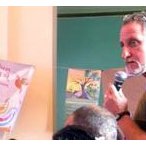
18 December 2012 | Interviews | Water | Latin American Meeting on Environmental Education Experiences of the Peoples | Human rights | Gender
Socio-Natural Capacity Building and Articulation
Interview with Jesus Figueredo from the Martin Luther King Jr. Memorial Center, Pinar del Rio - Cuba
The 5th Latin American Meeting on Environmental Education Experiences of the Peoples took place in Pinar del Rio, Cuba, from December 12-14. Over 80 environmental educators from Argentina, Brazil, Guatemala, Mexico, Colombia, Venezuela, Peru and Cuba participated in the event.
After 10 years of articulation of experiences, the challenge proposed by the Education and Promotion Center for Sustainable Development (CEPRODESO), who were the hosts and founders of this space, consisted in establishing a dialogue with the different environmental education experiences of the peoples around the political influence of these practices.
The meeting also took place as part of the efforts to continue discussing the reasons behind environmental struggles, not only taking experience as a basis, but also the social being created by the different networks of collective building.
Real World Radio, through its correspondent Danilo Urrea, was present in Pinar del Rio and interviewed Jesus Figueredo, member of the Martin Luther King Jr. Memorial Center, who works on the peoples´ education program with local experiences. Jesus is also part of the Network of Peoples´ Educators of Cuba and the Environmental Education Network.
Taking the classic forms of environmental education under development in the 80s as a basis, the Cuban organizations started to transform themselves and changed perspectives around the Earth Summit of 1992 in Rio, stepping away from a deep criticism to environmental education and its limits to read the relationship between human beings and nature.
The “Special Period” in Cuba began in the 90s and it still continues, according to Figueredo, and it is proof of an economic crisis with consequences for the relationship among human beings and between them and nature. This translates in a transformation at the level of the ethics of the Cuban people, and a new education approach appeared around environmental issues, based on the peoples.
The 5th meeting included experiences that gathered communities of practice as a collective being of analysis and discussions. One of these communities was that of capacity building and articulation.
“There are at least three essential elements under discussion, we speak of a community of practice, but it is not a community that doesn´t take into account individualities, experiences, the praxis itself of each person. Here, we can identify three basic elements: the political sense and political influence of the environmental education of the peoples; the element of epistemology, how we build another epistemology from the political sense, from a holistic view of environmental and educational work; and the ethical dimension of this political sense and knowledge building", said Figueredo.







